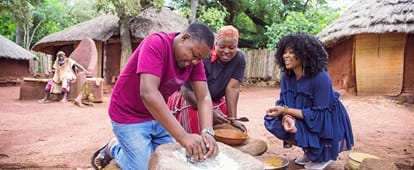By creating an account, I agree to the
Terms of service and Privacy policy
Choose your country and language:
Africa
Americas
Asia Pacific
Europe
TThe history of Zulu cuisine goes back to an era where traditions and values were important elements to the Zulu identity. Zulu cuisine is still very much influenced by tradition and its celebration of history and a commitment to culture. Owing to historical agricultural methods, a lot of foods in Zulu cuisine are organic and don’t require extensive processing. Agriculture and farming have played a principle role in pre-modernist Zulu society, and these practices have greatly influenced the culture of Zulu cuisine.
The separation of meat is a common cultural practice, and meat is proportioned and separated according to age and gender. Men receive portions that are referred to as “high status portions”, which would include iNhloko (the head), usually cooked in a potjie (three-legged pot), and iSibindi (liver). The liver symbolises human bravery, much like the heart in many other cultures, and is served medium rare with salt on the side.

MMale children, teenage males, young males and unmarried males are considered “boys” in Zulu culture, and are allocated the amanqina (feet), hind legs and lungs. Women and girls are given usu (tripe), which is served with iDombolo (a dumpling) and uJeqe (steamed bread).
Zulus generally eat a lot of beef and dairy products, the former owing to the majority of traditional ceremonies requiring and revolving around the slaughter of livestock. The Zulus, like many other cultures, consume amasi (sour milk), which is usually prepared by storing unpasteurised cow’s milk in an igula (calabash container) to allow it to ferment.
Maize meal is a staple Zulu food, and is usually eaten in a dish called uphutu, which is a crumbly maize meal porridge generally eaten cold with amasi but is also enjoyed hot with beans or cabbage.

AAbout the author
Andile Sikhakhane, well known as Chef Scott, is an internationally and locally experienced chef, who works as a private chef, caterer and restaurant consultant. He hosts an event, the Culinary Experience, in partnership with Rémy Martin Cognac every two months in Durban and Johannesburg. The Culinary Experience, in partnership with. Chef Scott is enthusiastic about promoting traditional Zulu cuisine and posts many recipes on his website, The Culinary Experience.
Related articles

